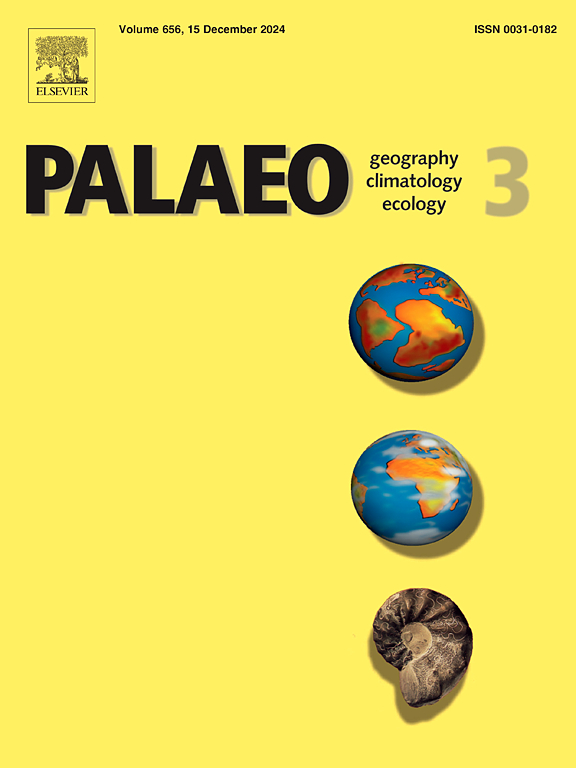丹斯加德-奥什格振荡期间南亚地区的侵蚀和风化对印度夏季季风变化的敏感反应
IF 2.6
2区 地球科学
Q2 GEOGRAPHY, PHYSICAL
Palaeogeography, Palaeoclimatology, Palaeoecology
Pub Date : 2024-09-21
DOI:10.1016/j.palaeo.2024.112516
引用次数: 0
摘要
大陆风化在通过负反馈调节长期气候稳定性方面发挥着关键作用。然而,大河流域的侵蚀和风化是否以及如何应对快速气候变化(如千年尺度)仍不清楚,部分原因是缺乏具有可靠年龄模型和高采样分辨率的档案。作为最大的沉积物源-汇系统之一,喜马拉雅-甘加/布拉马普特拉河-孟加拉湾系统被认为是研究过去风化-气候关系的理想实验室。在此,我们介绍了来自孟加拉湾年龄约束良好的岩心沉积物的元素和矿物学数据,这些数据记录了上一个冰川期南亚的侵蚀和风化条件。所有代用指标在冰川期间期的数值普遍大于冰川期末期的数值,这与区域海面温度(SST)和印度夏季季风(ISM)强度的千年变异是一致的。我们证实,恒河/布拉马普特拉河流域的侵蚀和化学风化信号对印度夏季季候风强度和/或温度变化敏感,可通过大河系统传播并忠实地保存在南亚边缘海中,不会出现明显的千年尺度时滞。我们的发现为大河流域的侵蚀和风化动力学对快速气候变化的响应提供了宝贵的数据,并凸显了季风驱动的洪泛平原大陆硅酸盐风化作为大量短期碳汇的巨大潜力,从而强调了在全球变暖的威胁不断升级的情况下一个关键的自然碳固存机制。本文章由计算机程序翻译,如有差异,请以英文原文为准。
Sensitive response of erosion and weathering to the Indian Summer Monsoon changes in South Asia during Dansgaard-Oeschger oscillations
Continental weathering plays a key role in regulating the long-term climate stability via negative feedback. However, whether and how erosion and weathering respond to rapid climate change (e.g millennial scale) in large river basins remains unclear, partly due to the lack of archives with robust age models and high sampling resolution. As one of the largest sediment source-to-sink systems, the Himalaya-Ganga/Brahmaputra River-Bay of Bengal system is considered as an ideal laboratory for examining the weathering-climate relationships over the past. Here we present the elemental and mineralogical data from well age-constrained core sediments in the Bay of Bengal, which document the erosion and weathering conditions in South Asia during the last glacial period. All proxies generally show larger values during glacial interstadials than the stadials, consistent with the millennial variabilities of regional sea surface temperature (SST) and the Indian Summer Monsoon (ISM) strength. We confirm that the erosion and chemical weathering signals in Ganga/Brahmaputra River basins, which sensitively respond to the ISM strength and/or temperature change, could be propagated through the large river systems and faithfully preserved in the South Asian marginal seas, without noticeable time lag on a millennial scale. Our findings provide valuable data for response of erosion and weathering dynamics in a large river basin to rapid climate changes, and highlight the immense potential of monsoon-driven continental silicate weathering in floodplains as a substantial short-term carbon sink, thus underscoring a pivotal natural carbon sequestration mechanism amidst the escalating threat of global warming.
求助全文
通过发布文献求助,成功后即可免费获取论文全文。
去求助
来源期刊
CiteScore
5.90
自引率
10.00%
发文量
398
审稿时长
3.8 months
期刊介绍:
Palaeogeography, Palaeoclimatology, Palaeoecology is an international medium for the publication of high quality and multidisciplinary, original studies and comprehensive reviews in the field of palaeo-environmental geology. The journal aims at bringing together data with global implications from research in the many different disciplines involved in palaeo-environmental investigations.
By cutting across the boundaries of established sciences, it provides an interdisciplinary forum where issues of general interest can be discussed.

 求助内容:
求助内容: 应助结果提醒方式:
应助结果提醒方式:


